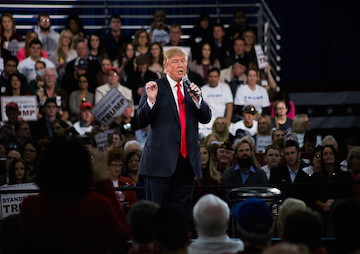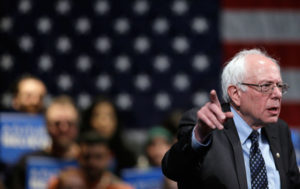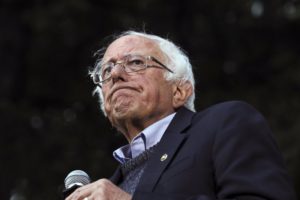The Useful Side of Trump
If the durability of Donald Trump's presidential candidacy has taken the political world by surprise, the sources of his electoral strength are no mystery. And the support he's winning reflects a crisis not only for the Republican and conservative coalitions, but also for the political system as a whole. iprimages / CC BY 2.0
iprimages / CC BY 2.0
If the durability of Donald Trump’s presidential candidacy has taken the political world by surprise, the sources of his electoral strength are no mystery. And the support he’s winning reflects a crisis not only for the Republican and conservative coalitions, but also for the political system as a whole.
Let it be said that Trump is not (yet) winning support from anything close to a majority of Americans. On the contrary, polling shows that a significant majority of Americans are anti-Trump. His unfavorable ratings have reached or approached 60 percent in many surveys.
But as the results from Tuesday’s Nevada caucuses confirmed again, Trump has built a large constituency inside the Republican Party based on a set of positions that marry two streams of thought not typically brought together by liberal or conservative politicians.
On the one hand, his call to deport 11 million immigrants who are here illegally, his support for a ban on the entry of Muslims to the United States, his invocation of law-and-order themes and emphatic support for the police, his endorsement of even rougher treatment of terror suspects — all speak to an authoritarian side of Trump’s appeal that clearly resonates with many on the Republican right.
But Trump embraces positions on economics and foreign policy anathema to most conservative politicians. He is an ardent critic of recent free-trade agreements, opposes cuts to Social Security and Medicare, has been even more vocal than many Democrats in criticizing President George W. Bush and the Iraq War, and even endorses the Democrats’ long-standing call for government negotiations with pharmaceutical companies to drive down drug costs.
This mix has allowed Trump to win votes from self-described moderates and conservatives alike, but his strongest support comes from voters at the lower end of the socioeconomic scale. This was true again in Nevada, as CNN reported from the entrance poll: Trump took 57 percent of the vote from caucus-goers who did not attend college but only 37 percent from those with postgraduate degrees.
No wonder that after the Nevada results were known, Trump offered one of the most memorable sound bites of the campaign: “I love the poorly educated,” he said.
The key lies in that rejection of conservative economic and fiscal orthodoxy (except in his endorsement of big tax cuts). But unlike Democrats, Trump is a sharp critic of illegal immigration, multiculturalism and “political correctness.” This is why dreams of a populist alliance between supporters of Trump and Bernie Sanders will be stillborn, as Thomas B. Edsall pointed out in The New York Times.
Trump is roiling an electoral system that has been in a kind of stasis for 16 years. Since 2000, the Democratic share of the national vote for president has ranged from a low of 48.3 percent in 2004 to a high of 52.9 percent in 2008. The Republican vote has varied from 45.7 percent in 2008 to 50.7 percent in 2004.
These are narrow ranges, with a slight tilt toward the Democrats. To achieve a breakthrough, each party needs to seize support in unfamiliar territory. Republicans need more votes from Latinos and Asian-Americans or from socially moderate-to-liberal middle-class white voters. Democrats need major advances in the white working class.
The Democrats’ losses over the years among downscale white voters have been dramatic, illustrated here in Kentucky in the once pro-labor coal counties. In Harlan, for example, Bill Clinton won 58 percent in 1996, but Democratic gubernatorial candidate Jack Conway took only 33.6 percent in 2015. In Perry, it was Clinton with 58.3 percent in 1996, and Conway with 35.1 percent in 2015.
Hillary Clinton, for one, is acutely aware of these losses, one reason that in her victory speech after last weekend’s Nevada Democratic caucuses, she spoke of the need for Democrats to “open our hearts to the families of coal country and Indian country.” This unlikely juxtaposition reflected her coalition-building hopes among very different groups that feel dispossessed.
“The global economy has changed more rapidly than many people’s ability to adjust to it,” Louisville Mayor Greg Fischer said in an interview. “It’s changing so fast that many people are asking, ‘Why am I being left out of this?'”
If Trump’s campaign leaves behind one useful legacy, it will be a heightened awareness of the deep hurt among the Americans Fischer is describing. They have been brutally battered by globalization and technological change. So far, Trump’s Republican rivals have had little to say to these voters. No wonder Trump loves the poorly educated.
Your support matters…Independent journalism is under threat and overshadowed by heavily funded mainstream media.
You can help level the playing field. Become a member.
Your tax-deductible contribution keeps us digging beneath the headlines to give you thought-provoking, investigative reporting and analysis that unearths what's really happening- without compromise.
Give today to support our courageous, independent journalists.






You need to be a supporter to comment.
There are currently no responses to this article.
Be the first to respond.